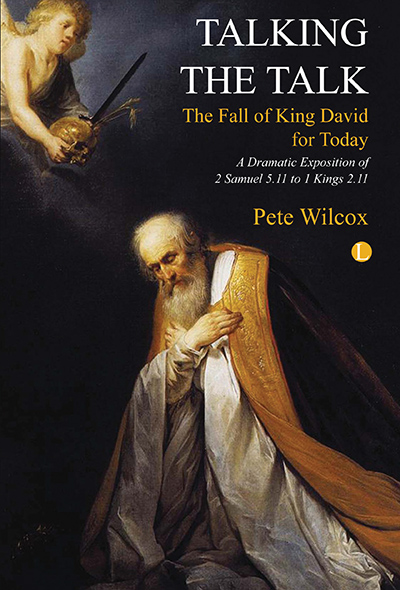Description
“The Spirit of the Lord speaks through me, His word is upon my tongue” – 2 Samuel 23.2
The author of Walking the Walk now tells the second half of the story of David, from the moment he becomes king of ‘all Israel’ to his death. Wilcox offers his readers an inspiring and timely exposition, combining as it does a subtle literary story with a robust theological analysis. More than just a bible commentary, Talking the Talk is also a populist reading aimed at a theologically untrained audience, approaching the narrative as a drama, consisting of acts and episodes divided into scenes. Addressed primarily to the contemporary western church, the book focuses attention on David’s capacity for repentance.
The story of David is a story about power: about the use and abuse of power in his relations with women (sex), with God (religion) and with officials, vassals or rivals (politics).
From the Introduction
About the Author
Educated in Cambridge and Oxford, Pete Wilcox is the author of many works and a contributor of leading British magazines, journals and media. His previous book, Walking the Walk, was published in 2009, and for which the current book is conceived as a sequel. Ordained as a priest in Church of England in 1988, he has served as Canon Chancellor at Lichfield Cathedral since 2006. In March 2012 he was appointed Dean of Liverpool Cathedral. He is married with two sons.
Contents
Introduction
Act 1: The Rule of David Established
1. 2 Samuel 5.11-25 David Established as King
2. 2 Samuel 6.1-23 David and the Ark
3. 2 Samuel 7.1-29 David and his House
4. 2 Samuel 8.1-18 David and his Enemies
Act 2: The Rule of David Threatened
5. 2 Samuel 9.1-13 David and Mephibosheth
6. 2 Samuel 10.1-19 David and the Arameans
7. 2 Samuel 11.1-27 David and Bathsheba
8. 2 Samuel 12.1-31 David and Solomon
9. 2 Samuel 13.1-39 Tamar and Absalom
10. 2 Samuel 14.1-33 David and the Wise Woman
11. 2 Samuel 15.1-37 The Rebellion of Absalom
12. 2 Samuel 16.1-23 David and Absalom
13. 2 Samuel 17.1-29 Absalom and Ahithophel
14. 2 Samuel 18.1-33 The Death of Absalom
15. 2 Samuel 19.1-43 David Resumes his Kingship
16. 2 Samuel 20.1-26 The Scoundrel Sheba
Act 3: The Rule of David Reviewed
17. 2 Samuel 21.1-14 David and the Gibeonites
18. 2 Samuel 21.15-22 David and his Servants
19. 2 Samuel 22.1-51 David’s Song
20. 2 Samuel 23.1-7 David’s Last Words
21. 2 Samuel 23.8-39 David and his Warriors
22. 2 Samuel 24.1-25 David and the Census
Act 4: The Rule of David Ended
23. 1 Kings 1.1-53 David and Adonijah
24. 1 Kings 2.1-11 The Death of David
Concluding Reflections
Index
Endorsements and Reviews
In Talking the Talk, Pete Wilcox takes the Christian Bible’s story of David seriously and critically to engage it as it actually is: a dramatic story, complete with episodes and acts, twists and turns, challenging ideas and more than a few surprises. For readers who wish to wrestle with scripture intelligently, Pete Wilcox makes a most congenial, perceptive guide.
Matthew Boulton, Harvard Divinity School
Pete Wilcox has a wonderful capacity for bringing biblical characters to life. The exposition of David’s kingship is both spiritually enriching and personally challenging, and is likely to evoke profound self-reflection in any Christian in a position of leadership.
Dr Robert Song, Durham University
A gifted storyteller, Wilcox deftly relates the content of the scenes, the complexities of relationships, the inner struggles, and lessons to be found in the story of David’s fall, with his commentary following each passage of the biblical text in a sustained narrative reading.
Reference & Research Book News, October 2011
This attractive commentary, with as many questions left open as sensitive proposals offered, is very warmly recommended.
Graeme Auld, in The Expository Times, Vol 123, No 3






